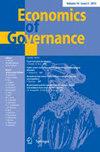党派分化、政治结盟以及州一级的联邦拨款支出
IF 1.2
4区 经济学
Q3 ECONOMICS
引用次数: 8
摘要
对联邦支出分配的研究提供了喜忧参半的证据,表明属于总统政党的立法者较多的州和众议院多数议员较多的州往往会获得更多的联邦资金分配。我们通过考虑政治两极分化和政治结盟如何影响美国国内预算如何分配给各州的总统和国会决定因素来补充这项研究。我们的研究结果表明,在政治两极分化相对较低的情况下,参议员占多数的州可以获得更大的人均联邦拨款支出份额。本文章由计算机程序翻译,如有差异,请以英文原文为准。
Party polarization, political alignment, and federal grant spending at the state level
Research on the distribution of federal expenditures has provided mixed evidence showing that states with more legislators who belong to the president’s party and states with more legislators in the chamber majority tend to receive a larger allocation of federal funds. We add to this research by considering how political polarization and political alignment impact these presidential and congressional determinants of how the domestic US budget is distributed to the states. Our results show that states with a larger percentage of senators in the majority can secure a larger share of federal grant expenditures per capita when political polarization is relatively low.
求助全文
通过发布文献求助,成功后即可免费获取论文全文。
去求助
来源期刊

Economics of Governance
ECONOMICS-
CiteScore
1.50
自引率
0.00%
发文量
22
期刊介绍:
Economics of Governance aims to foster research on governance at many levels: corporations, non-profit organizations, local and federal governments, and international organizations. Applications include the internal organization of firms, corporate governance, the private provision of public goods, local public policies, relations across levels of government, public expenditure and regulation, and problems of credibility and enforcement of international agreements. Though the journal aims to contribute to general economic knowledge, it is also interested in applying theoretical and empirical insights to important current topics. The journal is open to many approaches, including formal theoretical analysis, systematic observation, simulation, and empirical studies. Interdisciplinary contributions by economists, organizational scholars, and political scientists are encouraged.
Officially cited as: Econ Gov
 求助内容:
求助内容: 应助结果提醒方式:
应助结果提醒方式:


